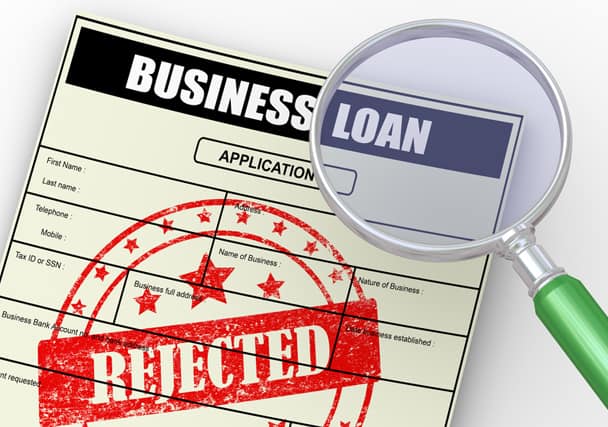
Why Are Business Loan Applications Rejected?
Running a business often requires an injection of external funds, whether for starting up, expanding, or managing cash flow. However, there are instances where business loan applications may be turned down by lenders. While this can be a very irritating experience, knowing all the reasons behind it can help prepare your business for a successful loan application in the future. Let’s take a detailed look at the common reasons why loan applications may get rejected.
Common Reasons Why Loan Applications May Get Rejected
-
Poor Credit History
One of the primary reasons for the rejection of business loan applications is the poor credit history of the business or its owners. Lending institutions examine the credit score to gauge the creditworthiness and repayment capacity of the loan applicant. A low credit score often indicates a history of missed payments or defaults, signalling to lenders that you might be a risky borrower.
-
Lack of a Solid Business Plan
When you apply for a small business loan, a solid and well-articulated business plan is essential. Lenders want to know that you have a clear plan for using the loan funds and a strategy for generating the income necessary to repay the loan. If your business plan is unclear, incomplete, or demonstrates a lack of planning, it can lead to your loan application being rejected.
-
Insufficient Collateral
Secured business loans require collateral, which can be seized by the lender in case the borrower defaults on the loan. If your business lacks the necessary collateral or if the value of the collateral is less than the loan amount, it can lead to the rejection of your business loan application.
-
Limited Cash Flow
Cash flow is the lifeblood of any business. It reflects your business’s health and its ability to repay the loan. Lenders often scrutinize your business’s cash flow to ensure that it is sufficient to cover loan payments in addition to other business expenses. If your business’s cash flow is inconsistent or insufficient, it can lead to a rejection when you apply for a small business loan.
-
High Debt-to-Income Ratio
Lenders also look at your business’s debt-to-income ratio, which compares your business’s monthly debt payments to its gross monthly income. If your business already has a significant amount of debt relative to its income, lenders might consider it over-leveraged and reject your loan application.
-
Lack of Business History
Newer businesses or startups often face challenges when they apply for small business loans. Many lenders prefer businesses with a track record demonstrating their viability and financial stability. If your business is new and lacks an established history, it can make lenders hesitant and result in a rejected loan application.
-
Incomplete Loan Application
When you apply for a small business loan, it’s crucial to provide complete and accurate information. Missing information or inaccurate data can raise red flags for lenders and may lead to your loan application being rejected.
-
Lack of Industry Experience
A business owner’s personal experience in the industry can have a significant influence on the lender’s decision. If you or your management team lack experience in your industry, lenders may perceive this as a risk factor. Demonstrating relevant experience can assure lenders that you have the required skills and knowledge to manage your business successfully and thus repay the loan on time.
-
Your Business is in a High-Risk Industry
Lenders also consider the industry your business operates in when assessing your loan application. Some industries are considered high-risk due to their instability, competitive nature, or susceptibility to economic downturns. If your business falls into one of these high-risk categories, lenders might be more cautious, leading to a possible rejection when you apply for a small business loan.
-
Unstable Personal Income of the Business Owner
While the focus is mostly on the business’s financial health, the personal financial stability of the business owner also matters to lenders. An unstable personal income can suggest financial instability, which could affect the business and, by extension, the repayment of the loan. A stable personal income instils more confidence in lenders and increases the likelihood of your loan application being approved.
-
Legal and Compliance Issues
If your business has any pending legal issues or has not complied with the necessary regulations and norms, this could lead to the rejection of your business loan application. Lenders prefer businesses that adhere to all relevant laws and have no legal disputes, ensuring that the loan repayment will not be hindered by unforeseen legal expenses or penalties.
-
Frequent Change in Business Ownership
Frequent changes in business ownership can raise concerns about the stability and continuity of the business. Lenders prefer businesses that demonstrate consistent management, as it suggests continuity and stability. Therefore, frequent changes in ownership can negatively impact your loan application.
-
Insufficient Market Demand
Lenders are more inclined to approve loans for businesses that operate in markets with consistent demand for their products or services. If the market for your business’s products or services is saturated, or if there is insufficient demand, lenders might consider it a risky proposition and reject your loan application.
Conclusion
Rejection of business loan applications can be a significant setback, but it should not deter you from seeking the funding your business needs. By understanding the potential reasons for rejection, you can take steps to mitigate these issues and improve your chances of approval when you apply for small business loan. Remember, each rejection is an opportunity to understand what needs to be improved, and with the right preparation and effort, your business can secure the funding it requires to grow and succeed.


